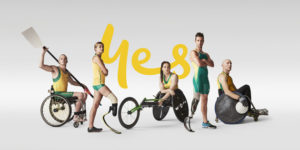When you face a great hindrance in reaching for your dreams, do you give up? What do you actually do to attain them? Do you resort to calling it quits when 80-90% of making it happen is a given failure? How do you actually define “impossible”? Is there such a thing? Or is it just a limitation we set in our minds? Is it fear of losing? fear of failure? being mocked? You can’t live with the embarrassment? The thing is, whatever answer you’ll come up with, you’ll never know until you try. That’s why these people whom I consider superheroes in their own right are worth featuring.

Toyota Ireland Announces New Partnership With Paralympics Ireland, Dublin 23/11/2017
Ellen Keane, Noelle Lenihan, Jason Smyth, Nicole Turner, Miriam Malone, CEO of Paralympics Ireland, Patrick Monahan and Steve Tormey, Chief Executive, Toyota Ireland pictured as Toyota Ireland has announced a new partnership with Paralympics Ireland that sees Ireland’s favourite car brand become an Official Partner to Paralympics Ireland and to the 2020 and 2024 Irish Paralympic Teams. This announcement builds on Toyota’s worldwide Olympic and Paralympic partnerships in the mobility category.
For more information visit www.toyota.ie
Mandatory Credit ©INPHO/Dan Sheridan
Challenges come to us in many forms. And surpassing them constitute our personal growth immensely. Subjective as how we overcome these challenges, the word “impossible” seems to have an objective gauge to be called so. Automatically, when something is undoable, it is considered “impossible”.
That being said, having physical disabilities or limitations belong to the “impossible”. As far as knowledge is concerned, this thought gets buried in drying cement if we talk about the olympics.
Or perhaps you want to take a look again.
The Paralympic Games is a major international multi-sport event involving athletes with a range of disabilities, including impaired muscle power (e.g. paraplegia and quadriplegia, muscular dystrophy, post-polio syndrome, spina bifida), impaired passive range of movement, limb deficiency (e.g. amputation or dysmelia), leg length difference, short stature, hypertonia, ataxia, athetosis, vision impairment and intellectual impairment. – WIKIPEDIA
There are these strong-hearted ones that may convince you otherwise though. For them, nothing is impossible:
Let’s take a closer look on how the challenges transformed them into making the “impossible” doable!

1. PANIPAK “TENNIS” WONGPATTANAKIT (THAILAND)
-
Thai Taekwondo Olympian
-
Rio 2016 Olympics Bronze Medalist
-
2018 Asian Games Gold Medalist
-
2017 World Championship Silver Medalist
-
2015 World Championship Gold Medalist
-
2014 Asian Games Bronze Medalist
-
2013 South East Asian Games Silver Medalist
At only seven years old, Panipak lost her mother in a car accident. Her dad recognised the positive impact that sports can make and encouraged her to take up taekwondo. Her goal beyond the arena with Toyota is to bring change by helping orphans and underprivileged children in Thailand. she sees it as a way of giving back to her community and country that supported her through thick and thin.
Panipak’s “impossible” and social change project is: SUPPORTING ORPHANS FOR BETTER

2. TOH WEI SOONG (SINGAPORE)
-
2017 ASEAN Para Games, Men’s 50M Freestyle – S7 – Gold
-
2017 ASEAN Para Games, Men’s 100M Freestyle – S7 – Gold
-
2015 ASEAN Para Games, Men’s 50M Freestyle – S8 – Gold
-
2015 ASEAN Para Games, Men’s 100M Backstroke and Freestyle – S8 – Gold
-
2013 Asian Youth Para Games, KL Malaysia – 100m Freestyle, Silver
Despite his disability, Wei Soong went to a regular school, where he was treated like everyone else. It was a big life lesson on the importance of equality, and instilled values in him that he applies to both sports and life beyond the pool.
Wei Soong’s “impossible” and social change project is: CHAMPIONING EQUALITY OF OPPORTUNITY
3. NENGAH WIDIASIH (INDONESIA)

Indonesia Women’s powerlifting:
-
2016 Rio de Janeiro – 41kg Paralympic Games – Bronze
-
2014 Dubai − 41 kg World Championships – Bronze
-
2014 Incheon − 41 kg – Asian Para Games – Silver
At just 3, Ni was diagnosed with polio and at 11, became separated from her family when she went to live in a special care facility for disabled children. Like a true champion, she was not going to let the impossible stand in her way. And now she is aiming, together with Toyota, at paving the way for the disabled, and improve accessibility in Indonesia.
Ni’s “impossible” and social change project is: LEADING THE WAY TO ACCESSIBILITY

4. MARCUS FERNALDI GIDEON (INDONESIA)
-
World Badminton Champion
-
2018 Asian Games Gold Medalist
At age 27, he got many awards together with his partner, Kevin Sanjaya Sukamuljo. Too many to mention in fact. But for Marcus, the real battle begins outside the arena. He may have played on some of the highest-quality surfaces in the world, but the streets in his hometown of Jakarta, are a different story. Road hazards and bad driving behaviour are a few of things he is fighting to change. Together with Toyota, he aims to improve road safety for Indonesians.
On the course of on the street, he will not stop fighting until he makes his mark.He won the 2017 All England Open Superseries Premier with his current partner Kevin Sanjaya Sukamuljo. He and Sukamuljo were recognised as the most outstanding players, and awarded as the 2017 BWF Best Male Players of the Year, after collecting seven Superseries titles.
Marcus’ “impossible” and social change project is: CHAMPIONING SAFER ROADS.

5. ANCHAYA KETKEAW (THAILAND)
- Paralympic Swimmer
- ASEAN Para Games Gold Medalist
On top of critics throwing overwhelming “Everything that you do is useless!” kind of comments, Anchaya had channelled all of her frustrations into focus. From when she lost her father when she was just 1, followed by her mom’s passing a decade after, she had always felt isolated and indifferent because of her disability. Anchaya was born with an incomplete, deformed right hand. Her mom always said, “Never be ashamed with your deformity.” which she tucked in her memory and remembered by heart. She dedicated all of her successes to her late parents, no matter big or small of an achievement.
Throughout her formative years, Anchaya was told she could not, she should not, she would not. But thanks to her dogged determination and refusal to give in to taunts of bullies, she did. All the bullying she faced, only added to her resolve to become a para swimming champion for her nation.
Anchaya’s “impossible” and social change project is: TAKING A STAND AGAINST BULLYING.
2018 ASIAN PARA GAMES
With 512 events in 18 sports, countries participating in the Para Games were challenged with the financial crisis each participant faces unlike with the real deal in the olympics. Sixteen events, also, are not medal events because of the limited number of participants. For an event to be considered a medal event, at least four athletes from two countries should be present to compete.
The 18 sports which are competed on are:

- Archery
- Athletics
- Badminton
- Boccia
- Bowling
- Chess
- Road and Track cycling
- Goalball
- Judo
- Lawn Bowls
- Powerlifting
- Shooting
- Sitting volleyball
- Swimming
- Table Tennis
- Wheelchair Basketball
- Fencing (Wheelchair)
- Wheelchair tennis
Out of 957 awards given out, China reigns in the first place. With a total of 105 gold medals, 53 silver ones and 39 bronze medals, it garnered a total of 197 medals all in all.
To be reminded once again, these are supposed athletes with limited abilities. Furthermore, some even lost the whole function of the lower limbs. But they strive. And they thrive. And they win. Moreover, with both the emotional and physical challenges it gives along the way, they gave no excuse to make it happen.
What’s your excuse again?
Credits to:
Mikyung Kim for allowing me to use data from her Instagram in featuring this heroes.
Toyota, the official sponsor of the 2018 Asian Para Games supporting all these social change project of these remarkable athletes.
Wikipedia

